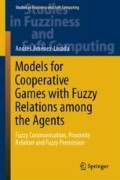Abstract
In this chapter we present another interesting model of games with a bilateral relation among the agents different to the communication model [6] (see Chap. 4) and the a priori unions one [7] (see Chap. 5). Hierarchical structures appears in a lot of human systems: firms, economic organizations, social networks, economic networks, protocolos... We consider several models in the literature with a same line which can be studied from bilateral relations. Gilles et al. [4] in 1992 introduced the conjunctive approach of permission structure.
Access this chapter
Tax calculation will be finalised at checkout
Purchases are for personal use only
Notes
- 1.
The concept of hierarchy in van den Brink [8] for instance involves transitivity, reflexivity and also only one top in the structure.
- 2.
van den Brink [9] introduced another approach, the disjunctive one, for hierarchical permission structures. The fuzzy version of the model has been studied in Gallardo et al. [2] in the context of authorization structures (a broader field for hierarchical structures which are not necessarily bilateral relations).
- 3.
- 4.
- 5.
van den Brink [8] called this axiom weakly inessential player because he used another stronger version for the disjunctive approach.
- 6.
- 7.
Furthermore this option is not yet available in the literature.
- 8.
This axiom is not satisfied for all extension pl.
- 9.
This axiom is also not satisfied for any extension pl.
References
Gallardo, J.M., Jiménez, N., Jiménez-Losada, A., Lebrón, E.A.: Games with fuzzy permission structure: a conjunctive approach. Inf. Sci. 278, 510–519 (2014)
Gallardo, J.M., Jiménez, N., Jiménez-Losada, A., Lebrón, E.A.: Games with fuzzy authorization structure. Fuzzy Sets Syst. 272, 115–125 (2015)
Gallardo, J.M.: Values for games with authorization structure. Ph.D. thesis. University of Seville. Spain (2015)
Gilles, R.P., Owen, G., van den Brink, R.: Games with permission structures: the conjunctive approach. Int. J. Game Theory 20(3), 277–293 (1992)
Huettner, F., Wiese, H.: The need for permission, the power to enforce, and duality in cooperative games with a hierarchy. Int. Game Theory Rev. 18, 4 (2016)
Myerson, R.B.: Graphs and cooperation in games. Math. Oper. Res. 2(3), 225–229 (1977)
Owen, G.: Values of games with a priori unions. In: Henn, R., Moeschlin, O. (eds.) Mathematical Economics and Game Theory. Lecture Notes in Economics and Mathematical Systems, vol. 141, pp. 76–88. Springer, Berlin (1982)
van den Brink, R.: Relational power in hierarchical organizations. Ph.D. thesis. Tilburg University. The Netherlands (1994)
van den Brink, R.: An axiomatization of the disjunctive permission value for games with a permission structure. Int. J. Game Theory 26, 27–43 (1997)
van den Brink, R., Gilles, R.P.: Axiomatizations of the conjunctive permission value for games with permission structures. Games Econ. Behav. 12, 113–126 (1996)
van den Brink, R., Dietz, C.: Games with a local permission structure: separation of authorization and value generation. Theory Decision 76(3), 343–361 (2014)
Author information
Authors and Affiliations
Corresponding author
Rights and permissions
Copyright information
© 2017 Springer International Publishing AG
About this chapter
Cite this chapter
Jiménez-Losada, A. (2017). Fuzzy Permission. In: Models for Cooperative Games with Fuzzy Relations among the Agents. Studies in Fuzziness and Soft Computing, vol 355. Springer, Cham. https://doi.org/10.1007/978-3-319-56472-2_6
Download citation
DOI: https://doi.org/10.1007/978-3-319-56472-2_6
Published:
Publisher Name: Springer, Cham
Print ISBN: 978-3-319-56471-5
Online ISBN: 978-3-319-56472-2
eBook Packages: EngineeringEngineering (R0)

